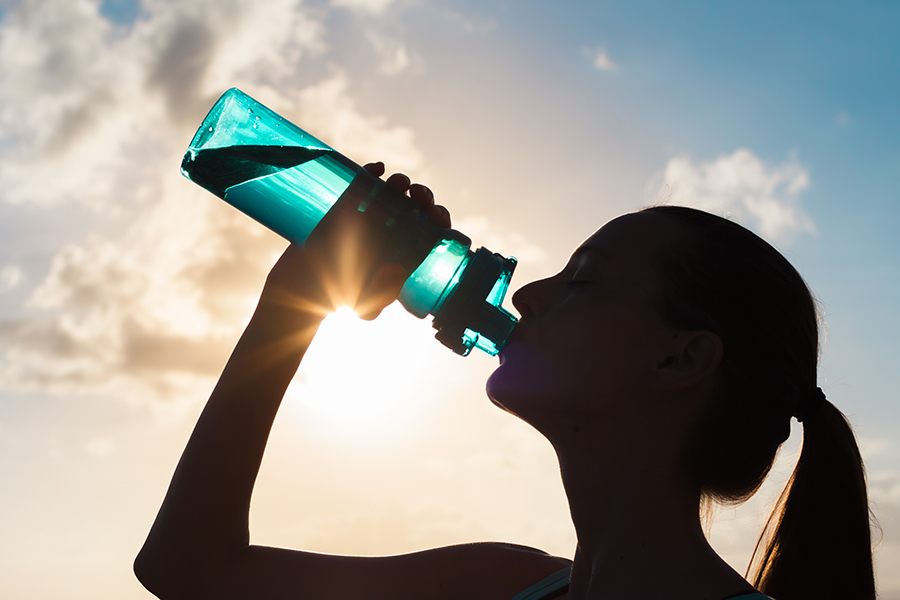You understand the importance of proper hydration for your horse, so you always make sure he gets the right amount of water and electrolytes — but it’s just as vital to pay attention to your own hydration needs!
Proper hydration is as important for yourself as it is for your horse. Being dehydrated can impair your thinking and affect the ability of your organs to work properly. Excess hydration, on the other hand, increases the need for toilet facilities! Proper hydration involves not only adequate water intake — it also means avoiding dehydrating fluids or substances, and getting enough electrolytes.
Managing hydration
Unfortunately, many people are mildly dehydrated most of the time. By the time we may recognize the signs of dehydration (dry mouth, fatigue, dizziness, headache), we are already fairly dehydrated. Constant attention to hydration – not just during physical activity — is important. Having all your cells plump and hydrated before you start any exercise will help your body tolerate conditions that could cause dehydration.
Some people find measuring out how much they want to drink in the morning helps them keep an eye on the total volume of fluid to finish during the day. Others use a phone app to keep track of their fluid intake. Find what works for you. Water, mineral water and herbal teas all count toward the total. I do not recommend exceeding a gallon per day except in cases of excess heat and perspiration, because the cells in your body will be sloshing around in too much fluid and unable to function properly; contrary to dehydration, in which there is so little fluid the cells start shrivelling up. When you are well hydrated, you can go for a time without fluids and your body will adjust without moving into a dangerous range. The human body is about 60% water weight, so it can move fluids around as needed, for a while. When you are drinking enough fluids that your urine is clear and copious, your intake is probably good.
Electrolyte balance
Another aspect of hydration involves electrolytes. You are probably checking and making sure your horse has adequate electrolytes, but are you thinking about your own? Electrolytes are essential for the proper function of the heart and every cell in the body. Calcium and magnesium are especially important for the heart, but sodium and potassium are important for all cells in your body, including the heart. If you drink reverse osmosis water, know that it has all the minerals taken out. You need to add the minerals back in, either through drops in the water, or rocks in a water dispenser.
Packets of a product like Emergen-C, added to your water bottle, work well while out riding. They contain a mineral ascorbate of vitamin C in addition to other minerals, so they also boost your system with antioxidants. Here in Arizona, people occasionally drink too much water (over a gallon a day) and are on a very low sodium and/or potassium diet. This can lead to serious heart symptoms. People working outdoors in the summer desert will take salt tablets to keep their sodium levels up as their bodies sweat profusely in the heat. On the other hand, too much salt in a sedentary elderly person with a weakened heart can create edema, raise blood pressure and put extra stress on the heart. In these situations, moderation can be important when dealing with electrolytes and water intake.
Dehydrating and dietary cautions
I have talked to people who rarely drink a lot of water because they are concerned about not being able to find a restroom in case of urinary urgency. Urgent or frequent urination has a variety of causes, and are a good reason for a visit to your physician. Sometimes these symptoms are caused by foods that irritate the bladder. In my experience, dairy products are a frequent culprit. These issues can also be caused by eating many different foods or taking many vitamin supplements, but without much water. You also want to watch out for diuretic beverages such as coffee, or alcoholic beverages like wine and beer. These beverages cause the body to dehydrate and lose the fluids it needs for cell function and heat management.
If the need to urinate comes on suddenly, it could be a low-grade urinary tract infection. Whatever the reason, investigate the cause with your doctor so you can resume drinking plenty of water to keep your body hydrated and functioning well!
In summary, adequate water intake is very important for your body. Be sure to maintain a balance of mineral electrolytes in whatever you are hydrating with, and beware of beverages or foods that may inhibit or reverse your hydration efforts.







